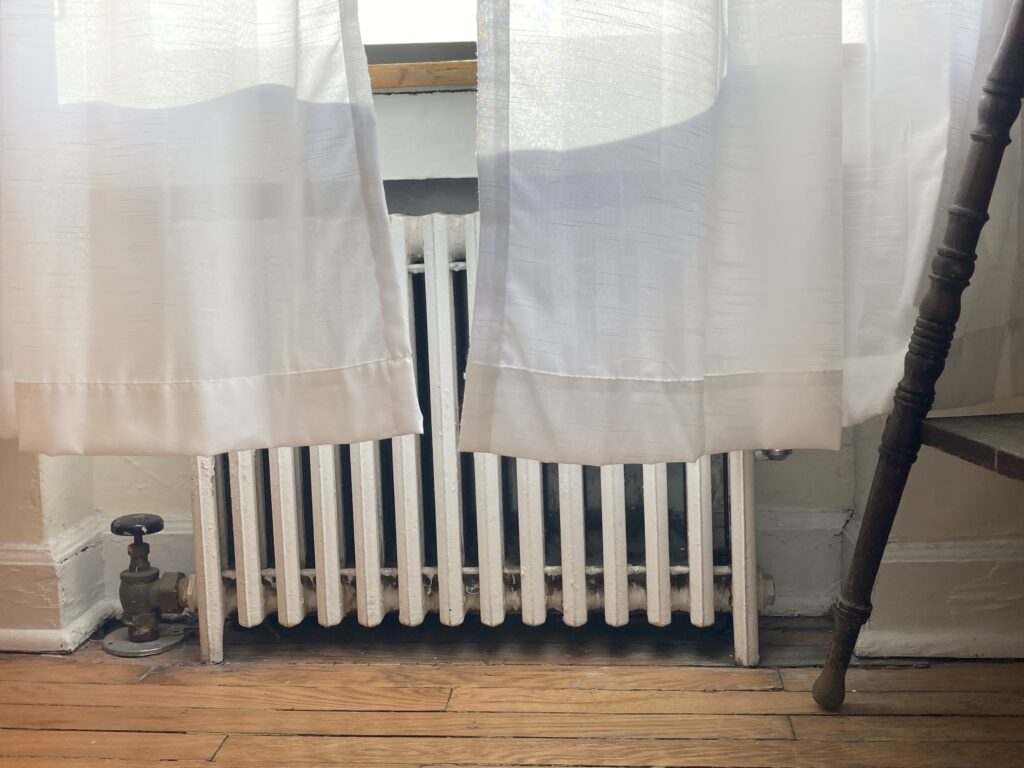My Curtains, My Radiator

Photograph by Mitchell Johnson.
I moved to Chicago late last summer and spent my first evening alone scrubbing and rescrubbing an old dresser I had found in the basement of my new apartment. It was plastered in dust and cobwebs, and dotted with some small dried-out things that were probably once eggs. Underneath, it was beautiful—maybe a hundred years old, a deep cherry color with intricate metal handles. I cleaned it and stapled fabric to the bottoms of the drawers, which still catch sometimes and deposit small slivers of wood on my T-shirts. Still, it works well enough.
I loved the apartment when I moved in. It has big windows and a back sunroom nestled in tree branches. Lake Michigan is just down the block. In the first couple weeks I lived here I would call my friends in other cities and tell them about my lake house, as I called it. It was a warm September, and I spent my days drifting back and forth down the street in my swimsuit. A neighbor told me that some people call Chicago in the summer Chiami.
In October it got too cold to swim. I spent most of my time alone in my apartment, grad school a thin tether to the world. Steadily, all of my things began to irritate me. The dresser. The lamp on the kitchen table that always fell over. The rug in the living room that slid under my feet. The toilet whose handle needed jiggling. The thin hollow doors through which I could hear my neighbors.
November came and the radiators didn’t work. Every few hours they would heat up for a couple minutes and then shut off. In between I would shiver in my living room. I called the management company, and they sent the gas company. Every week, maintenance workers came into my apartment to check and recheck my radiators, unable to find a problem. My downstairs neighbor and I discussed buying a thermometer to document how far below the legal residential temperature we were living.
On one visit, the building’s ancient custodian chided me for the curtains in my bedroom, which hang down and touch the radiator below the window. “Fire hazard,” she said, gathering up the bottom of the fabric and resting it on the windowsill. I took this as an injustice—that she would warn me about a fire in my freezing apartment. After she left I put the curtains back where they’d been. Every time the men from the gas company returned to check my radiators, I would pick up the curtains and put them on the sill, then let them drop back down after they left.
I googled “can radiators catch curtains on fire?” and found a confusing set of answers, ranging from equivocal to circular. “Steam doesn’t cause items to catch fire,” one website said. But then, further down, “flammable items can easily combust when set on top of a strong heat source.” Another said, “Water radiators usually don’t get hot enough to cause curtains to catch fire, but the radiator could still burn any fragile materials nearby.” I asked my friends; some were horrified and others told me not to worry. I tried and failed to find the temperature at which a cotton and polyester blend ignites.
The curtains are nothing special—I bought them at Target the weekend I moved in. But I felt committed to their right to drape normally, radiator or not. I didn’t want to remove or replace or hem them. More than anything, I didn’t want to submit, once again, to the demands of a flawed object.
I came home one day in December and the heat was fixed, almost too well. My apartment was tropical, humming with steam and metal. I put my down comforter back in the closet and started wearing shorts around the house. In the corner of my room, the curtains still caressed the hot metal, and every once in a while I’d remember the threat they did or did not pose. Mostly, though, I forgot about it. I made more friends, and spent less time in my apartment. My life thickened like a taper candle, as it always does.
Often I invited strangers over to have sex. I always wanted to host. I couldn’t bear to go to their apartments and see what I assumed would be their less disappointing things. After one man left, past midnight, the typical ennui settled in. I put on some Bruce Springsteen, “Dancing in the Dark.” A song about an imperfect life, about wanting to change it all. “Man, I ain’t gettin’ nowhere,” he sings, “I’m just livin’ in a dump like this.” The way he sings it, though, the sentiment becomes propulsive, transcendent. For Springsteen, as for Deleuze, desire is not a lack but a productive force. Disaffection holds affection like a cigarette between the teeth.
I looked over, as I often did, at the radiator and the Target curtains, wondering idly if they would kill me. Springsteen, in reassurance:
You can’t start a fire
You can’t start a fire without a spark
Mitchell Johnson is a writer living in Chicago.
Copyright
© The Paris Review
